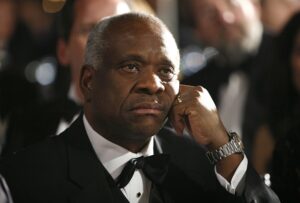
Like this, but in bronze. (Photo by Aude Guerrucci-Pool/Getty Images)
A proposal to erect a statue to Supreme Court Justice Clarence Thomas has made its way through the Georgia state Senate — along party lines, natch — and now heads to the House for debate. The proposal for the statue, to be funded by private donations, was introduced by Senator Ben Watson, who represents the district where Thomas was born.
As reported by Law & Crime, Watson’s comments in support of the statue focus on Thomas’s accomplishments, and place in history as the second Black justice on the Court.

7 Key Trends In Law Firm Rate Negotiations
And how to navigate them in 2026.
In support of the bill, Watson said that Thomas’s life has been “marked by tremendous achievement,” and that the justice “deserves a place of honor and recognition” in which future generations can be inspired by Thomas’s accomplishments.
Of course, not every member of the Court should have an honored place in history. And Thomas’s legacy is far from straightforward. His history on the Court been mired in controversy from his nomination on forward. From Anita Hill’s testimony about the sexual harassment she alleges she suffered at Thomas’s hands, to his terrible record on civil rights, to his stubborn refusal to recuse himself in matters before the Court that his wife, a political operative, has advocated on behalf of, there’s a lot to object to.
But in opposing the bill for Thomas’s statue, Senator Emanuel Jones went for the jugular, calling the Supreme Court justice an “Uncle Tom”:
Democratic state Sen. Emanuel Jones railed against Thomas, calling him an “Uncle Tom” for “betraying his own community.”
Jones went on at length about the meaning he ascribed to the insult and said it referred to “a person who, back during the days of slavery, sold his soul to the slave masters.”
“When we think of a person in the Black community who is accomplished, but yet whose policies seek to subvert —some would even say suppress— the achievements and accomplishments of people of color, I couldn’t help but think about that term,” Jones said.

How LexisNexis State Net Uses Gen AI To Tame Gov’t Data
Its new features transform how you can track and analyze the more than 200,000 bills, regulations, and other measures set to be introduced this year.
While that insult may have the sting of truth for some people, former Above the Law editor Elie Mystal has a more nuanced take:
Basically, I don't think Thomas is just a stepping and fetching mouthpiece for his white masters.
He's an independent thinker who happens to be wrong about everything and holds a dystopian, social Darwinist view of racial emancipation.— Elie Mystal (@ElieNYC) February 15, 2023
But it’s still understandable why there’s opposition to a statue in Thomas’s honor.
 Kathryn Rubino is a Senior Editor at Above the Law, host of The Jabot podcast, and co-host of Thinking Like A Lawyer. AtL tipsters are the best, so please connect with her. Feel free to email her with any tips, questions, or comments and follow her on Twitter @Kathryn1 or Mastodon @[email protected].
Kathryn Rubino is a Senior Editor at Above the Law, host of The Jabot podcast, and co-host of Thinking Like A Lawyer. AtL tipsters are the best, so please connect with her. Feel free to email her with any tips, questions, or comments and follow her on Twitter @Kathryn1 or Mastodon @[email protected].